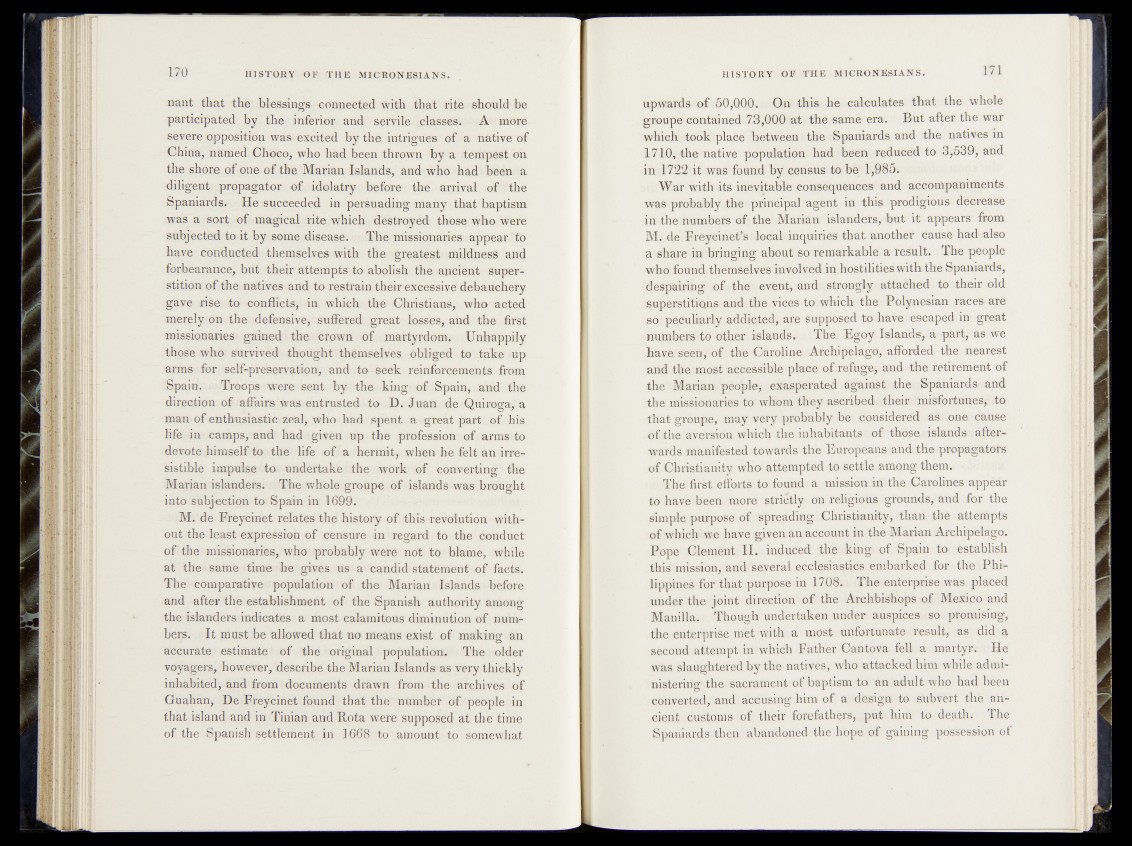
nant that the blessings—connected with that rité should be
participated by the inferior and servile classes. A more
severe opposition was excited by the intrigues • of a native of
China, named Choeo, who had been thrown by a tempest On
the shore of one of the Marian Islands, and who ’had4-been a
diligent propagator of idolatry before the arrival of* the
Spaniards. He succeeded in persuading many that baptism
was a sort of magical rite which destroyed those who were
subjected to it by some disease. The missionaries appear'to
have conducted themselves with the greatest mildness and
forbearance, but their attempts to abolish the ancient superstition
of the natives and to restrain their excessive' debauchery
gave rise to conflicts, in which the Christians, who acted
merely on the defensive, suffered great losses, and the first
missionaries gained the7crown-of martyrdom. Unhappily
those who Survived thought themseïvës obliged to take Up
arms for self-preservation, and to—seek reinforcements from
Spain. Troops- were sent by the king of Spain, and the
direction of affairs was entrusted to D. Juan :de Quiroga^ a
man of enthusiastic zeal, who had spent a great part of > his
life ;in-camps, and had given up the profession of arös#ó
devote jiimsëlf to the life of a hermit; when W ie lt amdirt*
sistibie impulse t o undertake the work of coaverting^ Jfae
Marian islanders. The whole groupe Of islands was brought
into subjection to Spain in 1699.
M. de Freycinet relates the history of this revolution without
the least expression of censure in regard to the conduct
of1 the missionaries, who probably were not to blame, while
at the same time he gives us a candid statement of facts.
The comparative population of the Marian Islands before
and after the establishment of the Spanish authority among
the islanders indicates a most calamitous diminution of numbers.
It must be allowed that no means exist of making; an
accurate estimate of the original population. The older
voyagers, however, describe the Marian Islands as very thickly
inhabited, and from documents drawn from the archives of
Guahan, De Freycinet found that the number of people in
that island and in Tinian arid Rota were supposed at the time
of the Spanish settlement in 1668 to amount to somewhat
upwards of 50,0,00. «k On this he calculates that the whole
groupe contained 73,000 at the same era. But after the war
which took place between * the Spaniards and the natives in
1710, the native population had been reduced to 3,539, and
in 1722 it was found by census to be l?y985. i
War with its inevitable consequences and accompaniments
was probably the principal agent in this prodigious decrease
in Aejrisumbers of the^Marian islandefs, Wt it appears from
M.; de. Freyeinef s iocal .inquiries -that another eause had also
a share « bringing about so remarkable»a result. The people
who found themselves involved in hostilities with the Spaniards,
despairing of the event, and strongly attachedvfo their old
superstitions and the vices to which itheftPolynesian races-are
■ so t peculiarly addicted,: are supposed.to hav&l escaped in: great
-numbers to other islands. The -Egoy Islands;,-a part, as we
have-seen/of»the Caroline Archipelago-, afforded- thevnearest
and the most nocessible place of refuge and the retirementof
the Marian people, exasperated against - the* Spaniards and
the misgirioariesto whom they ascribed .theism misfortunes,; to
that groupe, niay very probably be considered am oneo cause
oftoe, aversion which the inhabitantsJ of those islands afterwards
manifested towards the;Europeans land the propagators
of Christianity who attempted to settlesamong themi -
| Thei first efforts to: found a- mission inithe^Garoliues apperir
to have been more .strictly on religious grounds, and for the
simplepurpose of spreading • Christianity, jthan the attempts
of which we have given an account in theMarianArchipelago.
Pope Clement; II. induced the king-of Spain to. ^establish
this mission, and several ecclesiastics embarked for the - Phi-
lippmes: for that purpose in 1708*- The enteifaasewas placrid
under the.-joint direction of the Archbishopsoi Mexico and
Manilla. Though undertaken binder auspices < so promising,
the enterprise rifet witifi a most unfortunate-; Result, as did a
second attempt in which FatherGantova fehs a martyr. He
was slaughtered by tori natives, who attacked him while administering
the sacrament of baptism to an adult wholbad been
converted, and accusing him of a -dfesign to subvert the ancient
customs of their, forefathers,, put him to-death. The
Spaniards then abandoned the hope of. gaining possession of